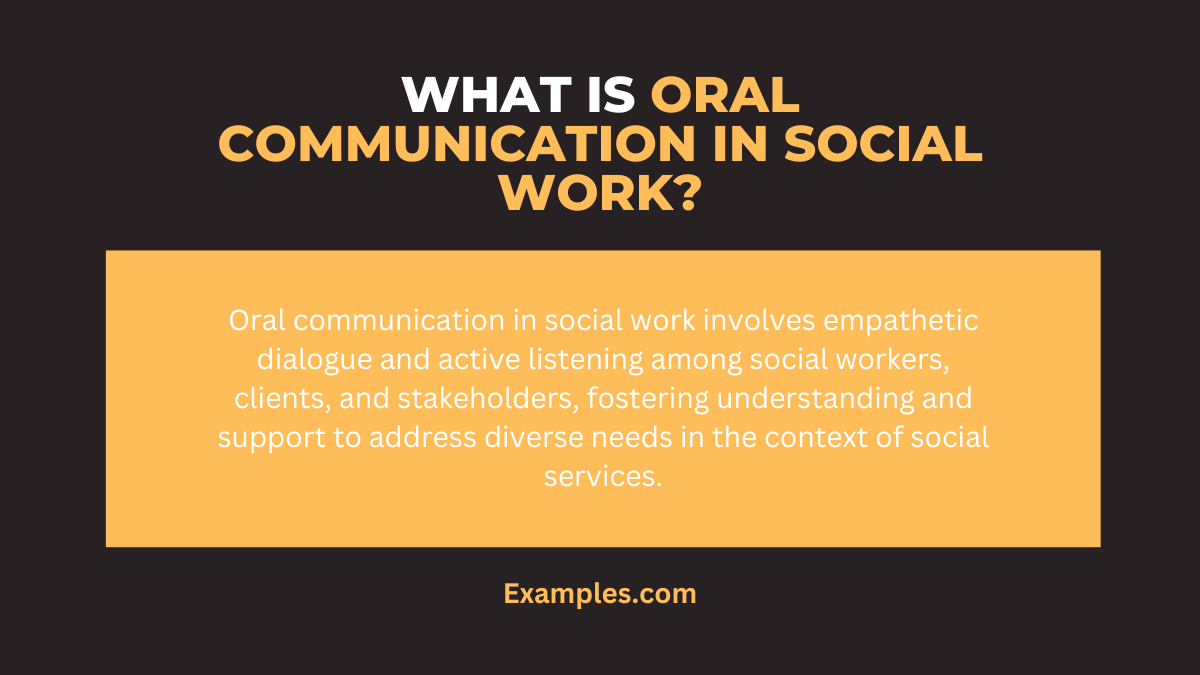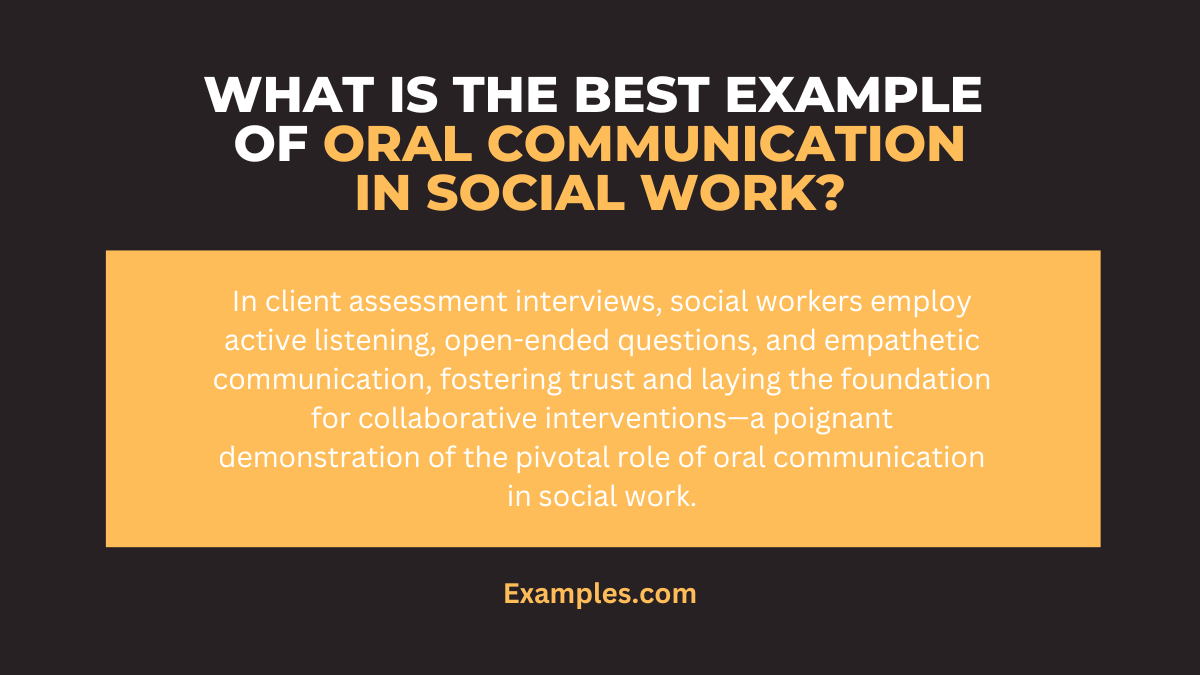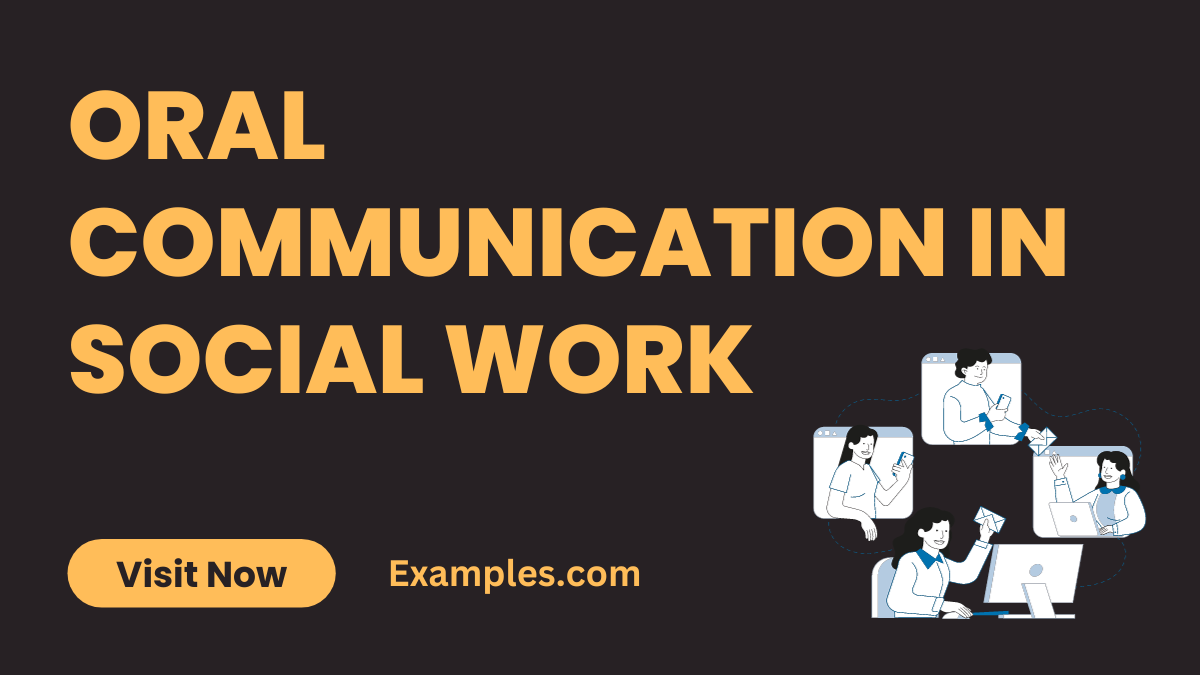Oral Communication in Social Work
Embark on a transformative journey through the realm of oral communication in social work. This comprehensive guide unravels the intricacies of effective communication, providing communication examples that resonate with the nuances of social work. From fostering empathetic connections to navigating real-life scenarios, discover the tools and insights essential for impactful interactions in the dynamic field of social work. Elevate your skills, make a difference, and create meaningful relationships through the art of oral communication.
What is Oral Communication in Social Work?

Oral communication in social work encompasses the verbal exchange of information, emotions, and support between social workers, clients, and stakeholders. It involves active listening, empathetic dialogue, and effective expression to address diverse needs within the context of social services.
What is the Best Example of Oral Communication in Social Work?

some content of testing….
A poignant example is the client assessment interview. During this crucial interaction, social workers employ active listening skills, ask open-ended questions, and engage in empathetic communication to understand clients’ challenges comprehensively. This fosters trust, establishes rapport, and lays the foundation for collaborative interventions, showcasing the pivotal role of oral communication in social work.
30 Oral Communication in Social Work Examples

These diverse examples showcase the versatility of oral communication in social work, emphasizing its role in building relationships, providing support, and effecting positive change.
- Empathetic Listening: Practicing empathetic listening allows social workers to understand clients’ emotions and concerns thoroughly, fostering trust and connection.
- Crisis Intervention Dialogue: During crisis situations, effective oral communication involves calming language, reassurance, and clear guidance to address immediate needs and stabilize emotions.
- Advocacy Discussions: Social workers engage in advocacy dialogues to champion clients’ rights, utilizing persuasive communication to influence policies and support social justice.
- Group Therapy Facilitation: Leading group therapy sessions requires adept communication skills to encourage open sharing and mutual support among participants.
- Child Welfare Consultations: Communication in child welfare involves sensitive discussions with families, emphasizing the best interests of the child and collaborative decision-making.
- Community Outreach Presentations: Effective oral communication is vital in community presentations, conveying information about social programs, resources, and support available to residents.
- Substance Abuse Counseling Conversations: Supporting individuals with substance abuse issues involves non-judgmental communication, motivational interviewing, and collaborative goal-setting.
- Trauma-Informed Interviews: Conducting trauma-informed interviews demands gentle and supportive communication to create a safe space for survivors to share their experiences.
- Case Conferencing Dialogues: Collaborative case discussions among multidisciplinary teams require clear and concise oral communication to strategize interventions and share insights.
- Mental Health Assessment Interviews: Oral communication in mental health assessments involves thorough exploration of clients’ thoughts, feelings, and behaviors to formulate accurate diagnoses.
- Domestic Violence Intervention Talks: Addressing domestic violence situations requires delicate yet assertive communication to empower survivors, provide resources, and facilitate safety planning.
- Conflict Resolution Dialogues: Resolving conflicts within social work teams demands effective communication to identify root causes, mediate differences, and enhance collaboration.
- Educational Workshops: Conducting educational workshops involves engaging oral communication to impart knowledge, promote skill-building, and facilitate group discussions.
- Home Visits Conversations: During home visits, social workers employ interpersonal communication to assess living conditions, understand family dynamics, and offer appropriate support.
- Parenting Skills Training: Teaching parenting skills involves clear and supportive oral communication to empower parents with knowledge and strategies for effective child-rearing.
- Grief Counseling Discussions: Supporting individuals through grief requires compassionate and empathetic oral communication to navigate the complexities of loss.
- Advocacy for LGBTQ+ Clients: Advocating for LGBTQ+ clients involves culturally competent and affirming oral communication to address unique challenges and promote inclusivity.
- Housing Assistance Consultations: Communication in housing assistance involves explaining eligibility criteria, facilitating applications, and providing guidance on available resources.
- School Social Work Conversations: Collaborating with educators, parents, and students in school settings requires effective communication to address academic, social, and emotional needs.
- Rehabilitation Planning Talks: Developing rehabilitation plans necessitates clear communication with clients, setting realistic goals, and fostering commitment to the rehabilitation process.
- Elderly Support Discussions: Supporting the elderly involves patient and respectful communication to understand their needs, address concerns, and enhance their quality of life.
- Human Trafficking Intervention: Addressing human trafficking situations requires discreet yet assertive communication to assist survivors, ensure safety, and collaborate with law enforcement.
- HIV/AIDS Education Sessions: Oral communication in HIV/AIDS education involves delivering accurate information, dispelling myths, and promoting preventive measures in a sensitive manner.
- Foster Care Placement Talks: Discussing foster care placement with children and families involves transparent and empathetic communication to address fears, expectations, and provide support.
- Community Needs Assessment Dialogues: Conducting community needs assessments requires effective communication to gather insights, identify priorities, and plan interventions.
- Anger Management Counseling: Helping individuals manage anger involves oral communication strategies to explore triggers, develop coping mechanisms, and promote emotional regulation.
- Financial Counseling Conversations: Offering financial counseling involves clear communication to assess financial situations, provide guidance on budgeting, and offer resources for economic empowerment.
- School Bullying Intervention Talks: Addressing school bullying demands effective communication with students, parents, and educators to create a safe and supportive environment.
- Resettlement Support Dialogues: Assisting refugees in resettlement involves clear oral communication to navigate cultural differences, provide resources, and facilitate integration.
- Disability Advocacy Conversations: Advocating for individuals with disabilities requires effective oral communication to address accessibility issues, promote inclusion, and ensure equal opportunities.
Oral Communication in Social Work For Students Examples
Oral communication is crucial for students pursuing social work, enabling effective interactions in diverse scenarios. Here are ten examples illustrating its significance:
- Client Intake Interviews: Students learn to conduct empathetic interviews, gathering essential information for effective support and intervention.
- School Counseling Conversations: Engaging with students, addressing academic challenges, and providing emotional support through empathetic communication.
- Community Outreach Presentations: Students practice delivering informative presentations to raise awareness about social issues and available resources.
- Youth Empowerment Workshops: Facilitating workshops that empower young individuals through skill-building and positive reinforcement.
- Case Study Presentations: Effectively presenting and discussing case studies to enhance analytical and communication skills.
- Family Mediation Simulations: Engaging in role-play scenarios to mediate family conflicts and promote constructive communication.
- Advocacy for Child Welfare: Students learn to advocate for children’s rights, communicating effectively to influence policies and ensure their well-being.
- Group Therapy Sessions: Leading therapeutic sessions, fostering a supportive environment for group members to share experiences and insights.
- Crisis Intervention Exercises: Simulating crisis situations to develop quick-thinking and communication skills under pressure.
- Policy Advocacy Debates: Engaging in debates to articulate and defend positions on social policies affecting vulnerable populations.
These examples not only enhance students’ oral communication skills but also prepare them for the diverse challenges they may encounter in the field of social work.
Oral Communication in Social Work in Real Life Examples
In real-life social work scenarios, effective oral communication is paramount. From empathetic counseling to community engagement, these examples demonstrate the diverse applications of verbal interaction.
- Community Advocacy Gathering:
- Organizing community gatherings for advocacy involves articulating social issues, inspiring collective action, and fostering collaboration among residents.
- Homelessness Outreach Dialogue:
- Engaging with individuals experiencing homelessness requires compassionate communication to understand their needs, offer support, and connect them with resources.
- School Parent-Teacher Conferences:
- Facilitating effective communication between parents and teachers involves navigating diverse perspectives, addressing concerns, and fostering collaborative solutions for students.
- Rehabilitation Center Support Talks:
- Supporting individuals in rehabilitation centers requires clear communication to motivate progress, address challenges, and involve clients in their recovery journey.
- Domestic Violence Survivor Counseling:
- Providing counseling to domestic violence survivors demands sensitive and empowering communication to help them process trauma, explore options, and plan for safety.
- Addiction Recovery Group Discussions:
- Leading group discussions in addiction recovery involves creating a safe space for participants to share experiences, provide mutual support, and reinforce commitment to sobriety.
- Mental Health Wellness Workshops:
- Conducting mental health workshops requires engaging communication to destigmatize mental health, provide coping strategies, and encourage self-care practices.
- Youth Mentorship Conversations:
- Communicating with youth in mentorship programs involves active listening, guiding personal development, and addressing challenges to promote positive life choices.
- Senior Citizens Socialization Events:
- Organizing events for senior citizens requires inclusive communication to enhance socialization, address isolation concerns, and provide opportunities for connection.
- Immigrant Integration Support Sessions:
- Assisting immigrants in integration involves clear communication to navigate cultural adjustments, offer language support, and connect individuals with community resources.
Oral Communication in Social Work for Interview Examples
Effective oral communication is crucial in social work interviews. These examples highlight the skills needed to navigate various interview scenarios and engage with diverse clients.
- Adoption Agency Parent Interviews:
- Conducting interviews for prospective parents demands compassionate communication to assess suitability, address expectations, and facilitate the adoption process.
- Child Protective Services Assessments:
- Assessing child welfare involves oral communication to gather information, evaluate safety concerns, and collaboratively develop plans with families.
- Job Placement Agency Client Interviews:
- Interviewing clients for job placement involves effective communication to understand skills, assess employment goals, and facilitate successful job matching.
- School Social Worker Student Interviews:
- Interviewing students involves creating a safe space for expression, identifying challenges, and collaborating with educators to address academic and emotional needs.
- Substance Abuse Treatment Center Admission Interviews:
- Conducting admission interviews in substance abuse treatment centers requires empathetic communication to assess readiness for recovery and develop personalized treatment plans.
- Crisis Intervention Hotline Caller Assessments:
- Assessing callers in crisis demands skilled communication to provide emotional support, assess risk, and guide individuals towards appropriate resources.
- Probation Officer Offender Interviews:
- Conducting interviews with offenders involves assertive yet supportive communication to assess compliance, address challenges, and promote rehabilitation.
- Geriatric Social Worker Aging Client Interviews:
- Interviewing aging clients involves sensitive communication to assess health needs, discuss care preferences, and develop comprehensive support plans.
- Disability Support Services Client Intake Interviews:
- Conducting client intake interviews for disability support services requires clear communication to understand needs, assess eligibility, and tailor support services.
- Human Trafficking Survivor Assistance Interviews:
- Interviewing human trafficking survivors demands trauma-informed communication to build trust, assess immediate needs, and coordinate comprehensive support.
These real-life and interview examples showcase the nuanced and critical role of oral communication in social work, emphasizing its impact on relationships, assessments, and transformative interventions.
What communication is used in social work?
Social workers utilize a range of communication methods, including oral, written, and non-verbal channels. Explore how these methods intersect to form a holistic approach that caters to the diverse needs of clients and stakeholders.
- Verbal Communication: Uncover the importance of verbal exchanges in expressing empathy, active listening, and conveying vital information during client interactions.
- Written Communication: Explore the role of written communication in documentation, report generation, and maintaining clear and concise records within the social work profession.
- Non-Verbal Cues: Understand the significance of non-verbal cues such as body language, facial expressions, and gestures in enhancing communication effectiveness and deciphering unspoken emotions.
- Adaptability in Communication Styles: Delve into the necessity for social workers to adapt their communication styles based on the unique needs, backgrounds, and preferences of diverse clients.
- Technology in Communication: Explore how technology has influenced communication in social work, from virtual sessions to digital documentation, and the implications for maintaining ethical and effective practices.
Why is oral communication important to us as a social being?
Oral communication holds profound importance in social work, serving as a linchpin for meaningful interactions and impactful relationships. This guide delves into the multifaceted reasons why oral communication is crucial for us as social beings, particularly within the context of social work.
Explore the innate need for connection and how oral communication fulfills this fundamental aspect of our social nature. Discover how effective verbal exchange fosters empathy, understanding, and a sense of community.
- Building Trust and Rapport: Investigate how oral communication establishes trust, laying the foundation for robust relationships between social workers, clients, and stakeholders.
- Expressing Empathy: Uncover the role of oral communication in conveying empathy, a vital component in addressing the emotional needs of individuals within the social work framework.
- Cultural Sensitivity: Examine the importance of oral communication in navigating diverse cultural contexts, ensuring sensitivity and respect for varying perspectives.
- Facilitating Collaboration: Understand how oral communication promotes collaborative efforts, allowing social workers to work seamlessly with clients, other professionals, and community members.
- Addressing Diverse Needs: Explore how verbal exchanges enable social workers to comprehend and respond to the diverse and complex needs of individuals and communities effectively.
How to Create an Oral Communication in Social Work Campaign?
Creating a successful oral communication campaign in social work demands a strategic and empathetic approach. This comprehensive guide provides a roadmap for developing and executing a compelling campaign that fosters meaningful connections, promotes inclusivity, and amplifies the impact of social work initiatives.
- Define Clear Objectives: Articulate specific goals for your oral communication campaign, aligning them with the broader mission of your social work organization.
- Audience Identification: Understand the unique needs and characteristics of your target audience to tailor your messages effectively.
- Craft Empathetic Messages: Develop messages that resonate emotionally, demonstrating cultural sensitivity and addressing the diverse perspectives within your community.
- Select Appropriate Channels: Choose communication channels based on accessibility, inclusivity, and the preferences of your audience, ensuring maximum reach.
- Invest in Training: Enhance the oral communication skills of social work professionals through training programs to maintain consistency and effectiveness.
Tips for Effective Oral Communication in Social Work?
Effective oral communication is paramount in the field of social work, forming the bedrock of successful client interactions and positive outcomes. This comprehensive guide provides actionable tips to empower social workers with the skills and strategies needed to communicate empathetically, build trust, and address the diverse needs of clients.
- Active Listening Techniques:
- Practice active listening to fully understand clients’ concerns.
- Use reflective responses to convey empathy and engagement.
- Cultural Sensitivity:
- Prioritize cultural sensitivity in communication, respecting diverse backgrounds.
- Tailor your approach to accommodate different cultural norms and values.
- Non-Verbal Communication:
- Leverage non-verbal cues like body language and facial expressions.
- Ensure your non-verbal communication aligns with verbal messages.
- Clarity and Simplicity:
- Communicate clearly and avoid unnecessary jargon.
- Break down complex information into easily understandable segments.
- Empathetic Language:
- Infuse your language with empathy and understanding.
- Validate clients’ emotions and experiences through your choice of words.
Oral communication plays a pivotal role in the field of social work. It is a tool for establishing rapport, assessing needs, and delivering services effectively. Social workers must be adept in various communication techniques to interact with clients from diverse backgrounds. This includes active listening, empathetic speaking, and non-verbal communication skills.
Active listening is crucial in social work. It involves fully concentrating, understanding, responding, and remembering what the client is saying. This skill can be further explored through resources like the University of Minnesota’s page on Listening Skills, which provides an in-depth understanding of effective listening techniques.
Empathetic speaking is another vital aspect. It is about being compassionate and understanding towards clients’ situations. This skill is beautifully detailed in the article “Empathy in Social Work” from the National Association of Social Workers.
Non-verbal communication, including body language, eye contact, and facial expressions, is equally important. The University of Kentucky has an insightful article on Nonverbal Communication that highlights its significance in social work.
In conclusion, mastering oral communication is essential for social workers. It is not just about talking; it’s about connecting, understanding, and effectively responding to the needs of clients. To delve deeper into this topic, resources from reputable educational and professional organizations can provide valuable insights and practical tips.



